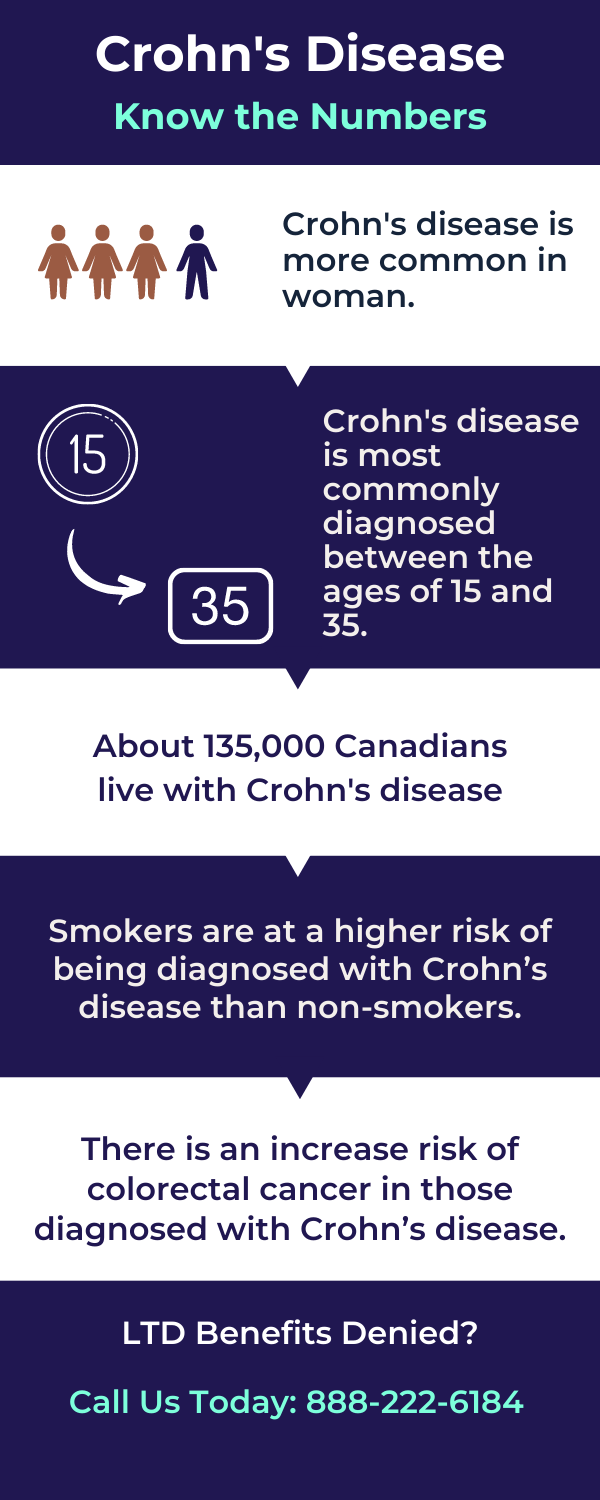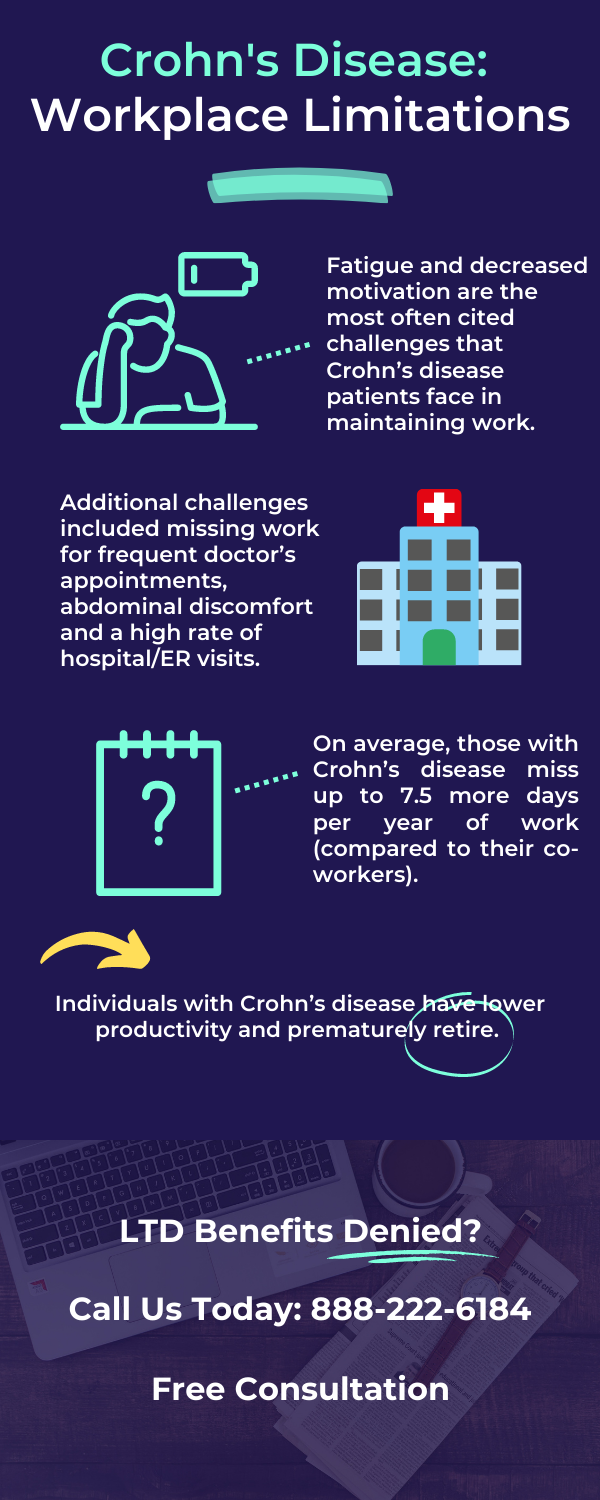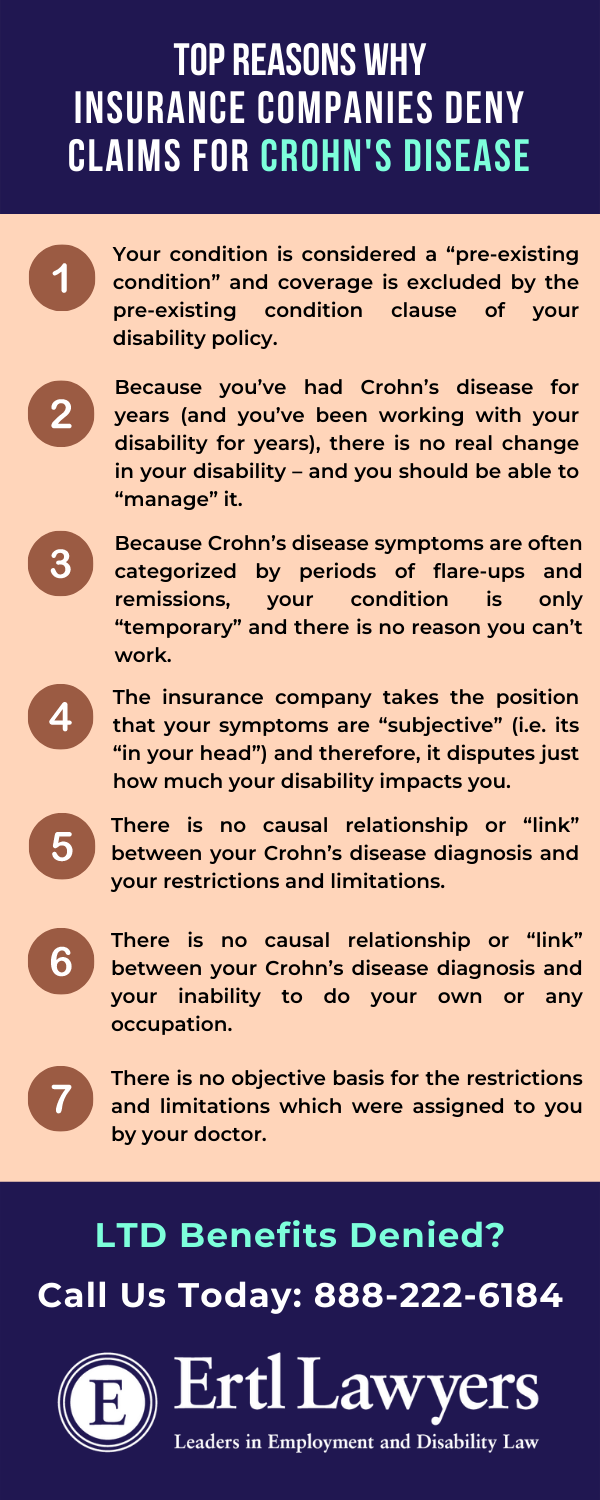Do I qualify for long-term disability benefits if I have Crohn’s Disease?
Can I Get Long-Term Disability for Crohn’s Disease?
By David Ertl, Disability & Employment Lawyer
One of the most common questions we get is “Do I qualify for long-term disability benefits if I have Crohn’s Disease?”
Crohn’s disease (Crohn’s) inflames the lining of the gastrointestinal tract and impairs your body’s ability to digest food, absorb nutrition and remove waste in a healthy and effective manner, and it can qualify for long-term disability benefits (also called LTD benefits).
Has your claim for disability benefits been denied? Has the insurance company denied your appeal? Were you receiving benefits and the insurance company terminated those benefits?
The experienced team at Ertl Lawyers can help you.
We’ll work with you and your physician to help challenge the insurance company’s denial or discontinuance of your long-term disability benefits.
Where necessary, we will engage other trusted professionals to support your case including specialists, functional capacity evaluators, and vocational evaluators to help credibly explain why your disability symptoms are preventing you from doing your “own occupation” or “any occupation”.
Ertl Lawyers offers:
✓ A free case assessment
✓ Fair, flexible rates, including contingency fees (i.e. only pay if you win)
✓ Service across all of Ontario
✓ If you are looking for long-term disability lawyers that care about your well-being, you’ve found us.
Our help can make all the difference.
Crohn’s Disease: Key Facts
Crohn’s disease is an inflammatory bowel disease and can occur anywhere in the gastrointestinal (GI) tract. Usually, however, Crohn’s tends to disturb the lower part of the small bowel and upper colon. The inflammation spreads throughout healthy sections of the gut and can penetrate the intestinal layers.
Crohn’s can be very similar to Colitis, another inflammatory bowel disease. Crohn’s disease lasts a lifetime and individuals who are diagnosed with Crohn’s can experience periods where they have active symptoms, or flare ups, and other times where they experience no symptoms.
The cause of Crohn’s disease is currently unknown and therefore, there is no cure. The goal of treatment is to reduce inflammation through medication and a specific diet.

See: Crohn’s and Colitis Canada and the Canadian Digestive Health Foundation
Most Common Symptoms of Crohn’s Disease
Abdominal
Abdominal pain and cramping are some of the most common symptoms of Crohn’s disease. Those diagnosed with Crohn’s disease can experience pain throughout the entire abdomen area. Diarrhea, nausea and vomiting often accompany abdominal pain.
Additionally, bloating and gas are quite common with Crohn’s disease and can be a contributing factor in the abdominal pain.
Sores and Bleeding
Those diagnosed with Crohn’s disease often display sores in the mouth and around the anus. Perianal disease is also a common symptom of Crohn’s disease, where a person develops skin tags, abscesses and fistulas.
Fatigue
Debilitating fatigue that can severely limit work and day-to-day activities.
Nutritional Deficiencies
Often, specific foods can cause a flare up of inflammation in individuals with Crohn’s disease. As a result, individuals with Crohn’s disease often experience malnutrition, weight loss, anemia and other deficiencies.[1]
Criteria for a Diagnosis of Crohn’s Disease
It is difficult to diagnose Crohn’s disease because it can be similar to other gastrointestinal diseases. Often, healthcare providers will attempt to rule out other causes of your symptoms prior to making a diagnosis of Crohn’s disease. Your doctor should ask you for a medical and family history as it is believed that genetics plays a role in the onset of Crohn’s disease.
There is no one test to determine Crohn’s disease. Often, doctors will perform blood tests, special imaging of the small bowel by MRI or ultrasound, or by performing an upper endoscopy or colonoscopy with biopsies.
Your doctor should ask you about the frequency and severity of your symptoms including how often you have bowel movements per day, how often you have diarrhea, if you ever had blood in your stool and how often, how often and how severe you have abdominal pain or cramping and if you experience any fatigue or lack of energy.
You may then be required to have stool tests and testing for related diseases such as malnutrition and anemia.
This is why long-term disability insurers often deny claims for Crohn’s disease: because it can be difficult to diagnose accurately in its early stages.
Treatment for Crohn’s Disease
Medication
Treatment for Crohn’s disease typically starts with anti-inflammatory drugs. These drugs include corticosteroids (e.g., prednisone) to help reduce inflammation in your body. Doctor’s only tend to prescribe these types of medications if you are unresponsive to other treatments. These types of medications are only used for short-term remedy to help kick start remission and may also be combined with an immune system suppressor (e.g., Azasan, methotrexate) to help reduce inflammation by targeting your immune system.
Alternatively, oral 5-aminosalicylates can be prescribed. These types of medications (e.g., Azulfidine) are now considered to provide minimal help.
Antibiotics are often prescribed and help with some of the symptoms of Crohn’s disease such as fistulas and abscesses. Some research has shown that the antibiotics may help reduce intestinal bacteria harmful to the body.
Other medications can be prescribed to help with some of the symptoms of Crohn’s disease such as pain relievers, anti-diarrheals, iron supplements, etc.
Nutrition Therapy
Since many individuals suffering from Crohn’s disease often experience malnutrition or other nutritional deficiencies, your doctor may recommend a special diet. These diets are intended to help reduce inflammation in your bowel, short-term, and improve your overall nutrition. This diet is often given by a feeding tube or injected into a vein.
A low-fiber diet may also be recommended by your physician to help reduce the risk of intestinal blockage and reduce the number and size of stool.
Diet in general plays a significant role in assisting alleviate the symptoms of Crohn’s disease. Keeping a food diary will help you identify what foods or beverages cause your Crohn’s disease to flare up and you can then limit your consumption of those foods.
Surgery
If medication, nutrition and lifestyle changes do not help alleviate the symptoms of Crohn’s disease, a patient may have to undergo surgery, such as:
- Removal of damaged digestive tract and reconnection of healthy tissues.
- Closure of fistulas and drainage of abscesses.
Almost half of all Crohn’s disease patients will require surgery at some point in their lives. The surgeries only provide for a short-term remedy and medication is required to minimize the risk of recurrence. Since Crohn’s disease is recurrent, often the disease returns after surgery and a patient could require another one.
Important: These surgeries also can be the basis of a disability claim.
Crohn’s Disease and Your Employment
Since there is currently no cure for Crohn’s disease, individuals who are diagnosed require long-term, lifelong, care. Additionally, since Crohn’s typically presents in individuals at a young age and onward, it plays a significant factor in an individual’s ability to maintain employment.
Consider the following:
- 46.6% of people suffering from Crohn’s disease require surgery within 10 years of being diagnosed.[2]
- Individuals diagnosed with Crohn’s disease are facing more than double the cost of healthcare for those who do not have Crohn’s.[2]
- 1 in 5 adults with Crohn’s disease are hospitalized in Ontario each year.[2]
- Individuals with Crohn’s disease are more likely to require time off of work, have lower productivity and prematurely retire.[2]
See our video: LTD Case Study: Crohn’s disease
Crohn’s Disease and Workplace Discrimination
It is unlawful to discriminate against someone in the area of employment based on their physical disability: Ontario’s Human Rights Code and the Canadian Human Rights Act.
If you are suffering from Crohn’s disease, you might face discrimination in a variety of ways:
- You are terminated from your job because you have Crohn’s disease.
- You are denied accommodation because of your Crohn’s disease.
- After returning from a disability sick leave, your employer places you in a lower, part-time position at a lower rate of pay
- Someone makes unwelcome remarks or jokes about your disability.
- Someone offends or humiliates you physically or verbally threatens or intimidates you because of your disability.
- Retaliating against you for filing a human rights complaint.
See our video: “Disability Discrimination”
Ertl Lawyers are experts in Employment and Disability Law. If you have been discriminated against, we can help, including:
- Having your employer comply with their duty to accommodate you.
- Having your employer stop all forms of discriminatory conduct.
- Representing you in wrongful dismissal, constructive dismissal, and human rights matters.
- Ensuring that your employer complies with its statutory obligations, including its obligations under the Employment Standards Act.
- Negotiation severance packages (including continuation of benefits).
What Are Some Steps You Should Take Before You Apply for Long-Term Disability Benefits for Crohn’s disease?
Review Your Policy Carefully
Your entitlement to disability benefits for Crohn’s disease depends on the specific wording of your disability policy.
Therefore, you will need to review your policy and see how it defines things like “totally disabled” and “occupation” – and whether any exclusions apply (particularly for pre-existing conditions).
Gather Medical Evidence
To be entitled to disability benefits for Crohn’s disease, every insurer requires you to provide medical evidence documenting how your illness or injury causes restrictions or lack of ability, such that you are prevented from performing the essential duties of your occupation.
Therefore, you will need a copy of your medical records to see if there is an objective basis for your diagnosis of Crohn’s disease and what your medical records say about your symptoms and your restrictions and limitations
Gather Evidence of Workplace Limitations
Because your entitlement to long-term disability benefits for Crohn’s disease depends on the strength of your evidence, you should get a copy of your employee file from work. It may show that your Crohn’s disease negatively impacted your work performance. Your work performance may have been affected by your frequent absences from work, pain, fatigue, etc.
Create a List of the Physical Duties of Your Job
You should get a copy of your job description. Based on that job description, you should write out a detailed list of the physical (and mental) duties associated with your job description – and explain how your Crohn’s disease limits or prevents you from performing you own occupation.
Ask Your Doctor for a Report
It is recommended that you provide your doctor with your occupational description. You should ask your doctor to prepare a report that clearly explains the objective basis for:
- your diagnosis of Crohn’s disease
- your restrictions and limitations
- reasons why you are unable to perform some or all of the essential duties of your own occupation.
Follow Your Doctor’s Treatment Plan
Your entitlement to long-term disability benefits also requires you to be receiving regular, ongoing care and treatment for your Crohn’s disease. In other words, don’t skip appointments, and always follow your doctor’s treatment plans.
Keep a Pain Diary
On your end, it is important to keep a pain diary. A pain diary is a written record that helps you keep track of when you have pain, how bad it is, and whether your treatment is helping.
What Other Benefits Might I Be Entitled to for Crohn’s Disease?
Other than short-term and long-term disability benefits through a group or individual insurance plan, people suffering from Crohn’s disease might be entitled to one or more of the following benefits:
- Employment Insurance (EI) Sickness Benefits;
- Ontario Disability Support Plan (ODSP);
- Disability Tax Credit (DTC);
- Disability Creditor Insurance (under your mortgage or credit cards);
- Trillium (extended health benefits);
- Canada Pension Plan Disability (CPP-D); and
- Disability Pension (employer).
Crohn’s Organizations / Associations / Colleges
- Crohn’s and Colitis Canada
- Canadian Digestive Health Foundation
- Gastrointestinal Society
Endnotes:
1. Aghdassi, Elaheh, Wendland, Barbara, Stapleton, Melanie, et al. Journal of the American Dietetic Association 2007. Adequacy of Nutritional Intake in a Canadian Population of Patients with Crohn’s Disease. September 2007, Volume 10, Issue 9, Retrieved from https://www.sciencedirect.com/science/article/abs/pii/S0002822307012916
2. Kapalan G, Benchimol E, Bernstein C, et al; 2018 Impact of Inflammatory Bowel Disease in Canada. Crohn’s and Colitis Canada [Online], 2020, retrieved from: https://crohnsandcolitis.ca/Crohns_and_Colitis/documents/reports/2018-Impact-Report-LR.pdf
3. Zand A, van Deen W, Inserra E, et al. Presenteeism in inflammatory bowel diseases: A hidden problem with significant economic impact. Inflamm Bowel Dis. 2015;21(7): 1623-1630.
4. Coward S, Clement F, Benchimol E, et al. The rising prevalence of inflammatory bowel disease in Canada: Analyzing the past to predict the future. Journal of the Canadian Association of Gatroenterology., 2018;1(Supp 2):A-29.
Disclaimer: The content on this web site is provided for general information purposes only and does not constitute legal, medical, or other professional advice or an opinion of any kind. Users of this web site are advised to seek specific legal advice by contacting members of Ertl Lawyers (or their own legal counsel) regarding any specific legal issues. Ertl Lawyers does not warrant or guarantee the quality, accuracy or completeness of any information on this web site.
Long-Term Disability Benefits Denied?
Ertl Lawyers provides expert representation in long-term disability matters.
The vast majority of disability matters are resolved through negotiation and mediation – and that’s because insurance companies know that we are passionate about our clients’ rights.
How we can help you:
• free disability policy analysis
• free case assessment
• applying for disability benefits
• appealing a denial or termination of your benefits
• disputing a denial through a legal claim
• handling all communications with your employer
• protecting your employment
• prosecuting human rights claims
Fair, Flexible Rates – Including Contingency Fees
(Don’t Pay Unless You Win)
Our Help Can Make All The Difference.
Related Blogs
Parental Leave in Ontario – Frequently Asked Questions
Parental Leave in Ontario - Frequently Asked Questions Author: David Ertl, Employment Lawyer What is parental leave? In Ontario, parental leave is an absence from work commencing after the baby is born. Section 48 of the Employment Standards Act, 2000 explains who is...
Employment Law: Constructive Dismissal – The Basics
Constructive Dismissal - The Basics Author: David Ertl, Employment Lawyer Constructive dismissal occurs when the employer decides to no longer be bound by the contract in place with the employee and makes a unilateral, fundamental change to the employment...
COVID-19: Economic Measures for Employers and Employees
As the COVID-19 pandemic continues to impact the lives of Canadians, the government has introduced several measures to assist those in need, including both employers and employees. While many businesses have been forced to close, many employers and employees alike...





